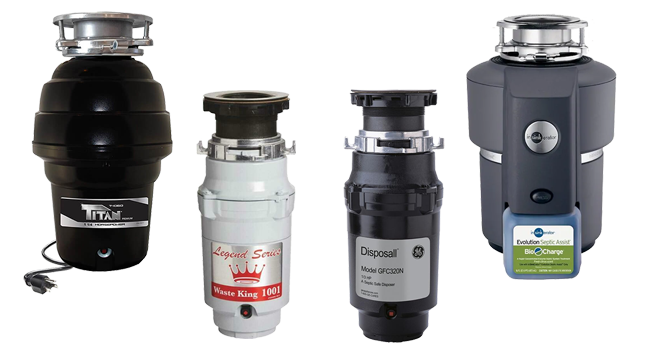Efficient Garburator Repair Work Solutions to Keep Your Kitchen Area Operating
Keeping an effective garburator is important for ensuring your kitchen area runs without interruption. Usual issues such as blockages or unusual noises can disrupt this essential device, leading to possible hassle and pricey fixings. What are the crucial actions to stop these concerns from escalating additionally?
Usual Garburator Issues
In several households, garburators are vital home appliances that promote the reliable disposal of food waste. These tools can run into numerous typical problems that may disrupt their performance. One common problem is jamming, frequently triggered by the introduction of difficult or fibrous products, such as bones or big vegetable peels. When this happens, the garburator may stop or send out uncommon noises operation completely.
An additional issue often reported is poor drain. This can originate from a build-up of food fragments within the unit or pipes, resulting in undesirable odors and possible backups. Customers may likewise experience irregular grinding performance, where food waste is not appropriately grated, leading to obstructions further down the pipes system.
Electric concerns, such as burnt-out electric motors or damaged circuitry, can stop the garburator from working appropriately, requiring instant attention. Comprehending these common garburator issues can aid home owners keep their home appliances and guarantee efficient operation.
Basic Fixing Steps
When garburator troubles occur, it's important to take on the situation carefully to restore capability. Check the circuit breaker or fuse box to verify that the garburator is not tripped or detached.
Next, examine for any kind of noticeable obstructions. Switch off the power and use a flashlight to check into the disposal chamber (Garburator repair). If you see any type of foreign things, thoroughly eliminate them making use of tongs or pliers-- never utilize your hands.
If the garburator hums yet does not grind, there might be a jam. In this case, by hand revolve the impellers using an Allen wrench inserted into all-time low of the system. This activity can aid free up any type of stuck debris.
Do It Yourself Fixing Methods
A selection of Do it yourself repair work techniques can successfully attend to usual garburator issues without the need for specialist help. One prevalent trouble is a garburator that won't turn on.
One more constant worry is a garburator that grinds gradually or blockages. To resolve this, first, transform off the system and detach the power.
For unpleasant smells, a basic service includes running citrus peels through the garburator. This not just freshens the odor yet likewise helps clean up the blades. Routine upkeep, such as flushing the system with warm water and ice cubes, visit our website can maintain the garburator in peak condition, ensuring it runs efficiently for years to come.
When to Call a Specialist
Making a decision whether to take on garburator issues on your own or call an expert can be tough. While numerous small issues can be solved with basic DIY methods, there are specific circumstances that warrant expert treatment.

One more important element is the presence of leakages. If you see water merging around the base of your garburator or think a failing seal, it's best to get in touch with an expert to stop further damages to your kitchen area. Safety and security is also extremely important; if you feel uncomfortable dealing with electrical elements or plumbing, calling in a specialist is a smart choice.

Upkeep Tips for Long Life

Ensuring the longevity of your garburator requires consistent upkeep and attention to detail. Normal cleaning is necessary; take into consideration using a combination of ice and coarse salt to aid remove particles and hone the blades. Running cool water while running the device will likewise help in eliminating food particles, avoiding clogs and unpleasant smells.
In addition, be conscious of what you dispose of in your garburator. Stay clear of coarse products such as celery Check This Out and onion skins, in addition to starchy foods like pasta and rice, which can trigger obstructions. Instead, emphasis on tiny, soft food scraps to lessen stress on the unit.
Occasionally evaluate the garburator's elements for deterioration. Guarantee that the rubber splash guard is undamaged which the grinding chamber is totally free of buildup. If you discover any type of unusual noises or smells, address these issues promptly to avoid more damage.
Finally, consider running an upkeep solution made for garburators to help damage down grease and odor-causing germs. By adhering to these maintenance tips, you can considerably expand the lifespan of your garburator, guaranteeing it remains a dependable component in your kitchen.
Verdict
In final thought, keeping an effective garburator is critical for optimal kitchen area performance. Sticking to maintenance tips will certainly improve the durability and efficiency of the garburator, making sure an efficiently operating cooking area environment.
Electrical issues, such as burnt-out motors or damaged circuitry, can prevent the garburator from functioning appropriately, requiring instant focus. Understanding these usual garburator issues can assist property owners preserve their home appliances and make sure efficient procedure.
A range of Do it yourself fixing techniques can efficiently address usual garburator issues without the need for specialist support. Garburator repair. Routine maintenance, such as purging the unit with warm water and ice cubes, can maintain the garburator in peak problem, ensuring it runs efficiently for years to come
If you see water pooling around the base of your garburator or believe a stopping working seal, it's best to seek advice from a professional to protect against further damages to your kitchen.